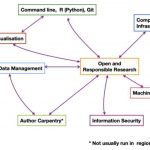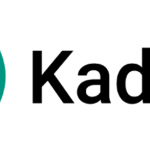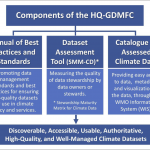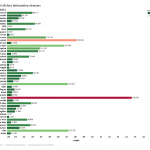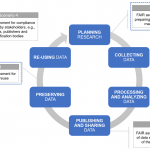

UNOCHA: Why the climate crisis is a humanitarian emergency
The unfolding climate emergency is adding an additional layer of stress to humanitarian organisations that are already stretched thinner than ever before.
Texas Blackouts Point to Coast-to-Coast Crises Waiting to Happen
Continent-spanning storms triggered blackouts in Oklahoma and Mississippi, halted one-third of U.S. oil production and disrupted vaccinations in 20 states.
Smart weather app helps Kenya’s herders brace for drought
As climate change brings more weather extremes, access to village-level drought updates and advice via smartphones is helping under-pressure pastoralists cope.
WMO: Artificial intelligence can boost disaster management
The World Meteorological Organization is participating in a new interdisciplinary Focus Group to contend with the increasing prevalence and severity of natural hazards with the help of artificial intelligence (AI).
Drier European summers projected under climate change
A new study projects that summers across the continent will become drier for most of Europe through the century. Furthermore, human-induced climate change is expected to increase the frequency of extremely dry conditions across all of Europe.

UNEP: Making Peace With Nature – A scientific blueprint to tackle the climate, biodiversity and pollution emergencies
This report identifies the shifts needed to close gaps between current actions and those needed to achieve sustainable development. The analysis is anchored in current economic, social and ecological reality and framed by economics and the 2030 Agenda for Sustainable Development.
Heat and health in the WHO European Region: updated evidence for effective prevention
This publication collates and summarises the most relevant evidence published since 2008, focusing primarily on Member States in the WHO European Region. Findings are organised around the elements the original guidance document identified as “core” to a comprehensive heat–health action plan (HHAP), and these are complemented in each chapter with the results of a WHO survey of heat–health action planning in 2019, where relevant to the topic covered.
UNEP: The climate risk landscape – Mapping climate-related financial risk assessment methodologies
The report ‘The Climate Risk Landscape: Mapping Climate-related Financial Risk Assessment Methodologies’ provides a summary of the key developments across third party climate risk assessment providers since May 2019, including new and updated scenarios, methodological tools, key guidelines, as well as an overview of the changing regulatory landscape and potential developments into 2021.
WHO guidance for climate-resilient and environmentally sustainable health care facilities
The aim of this guidance is to enhance the capacity of health care facilities to protect and improve the health of their target communities in an unstable and changing climate; and to empower health care facilities to be environmentally sustainable, by optimizing the use of resources and minimizing the release of waste into the environment.

21-23 June (Virtual) – FAIR Festival 2021
The FAIR Festival 2021 will feature plenary sessions, provide an open space to continue ongoing discussions as well as allow a collaborative “Deep Dive” into crisp sessions where FAIR practices on GO BUILD – GO TRAIN – GO CHANGE will be presented by Implementation Networks.
8 March – International Women’s Day: Women in leadership – achieving an equal future in a COVID-19 world
This International Women’s Day, UNDRR’s Women’s International Network on Disaster Risk Reduction and UN Women’s Regional Office for Asia-Pacific will co-host a virtual event highlighting the need for women’s leadership in COVID-19 recovery, and recognising the women who have played an essential role in their country’s COVID-19 response.
22 March – GYA Satellite Panel: Trust in Climate Change
This GYA event brings together senior and early-career scientists to address trust in climate science, starting from the contributions of their diverse scientific disciplines..






